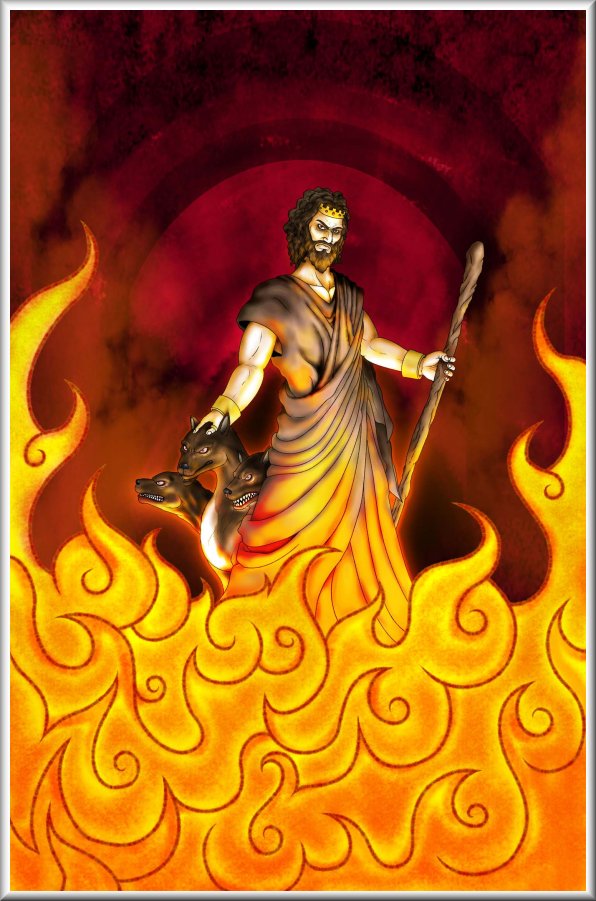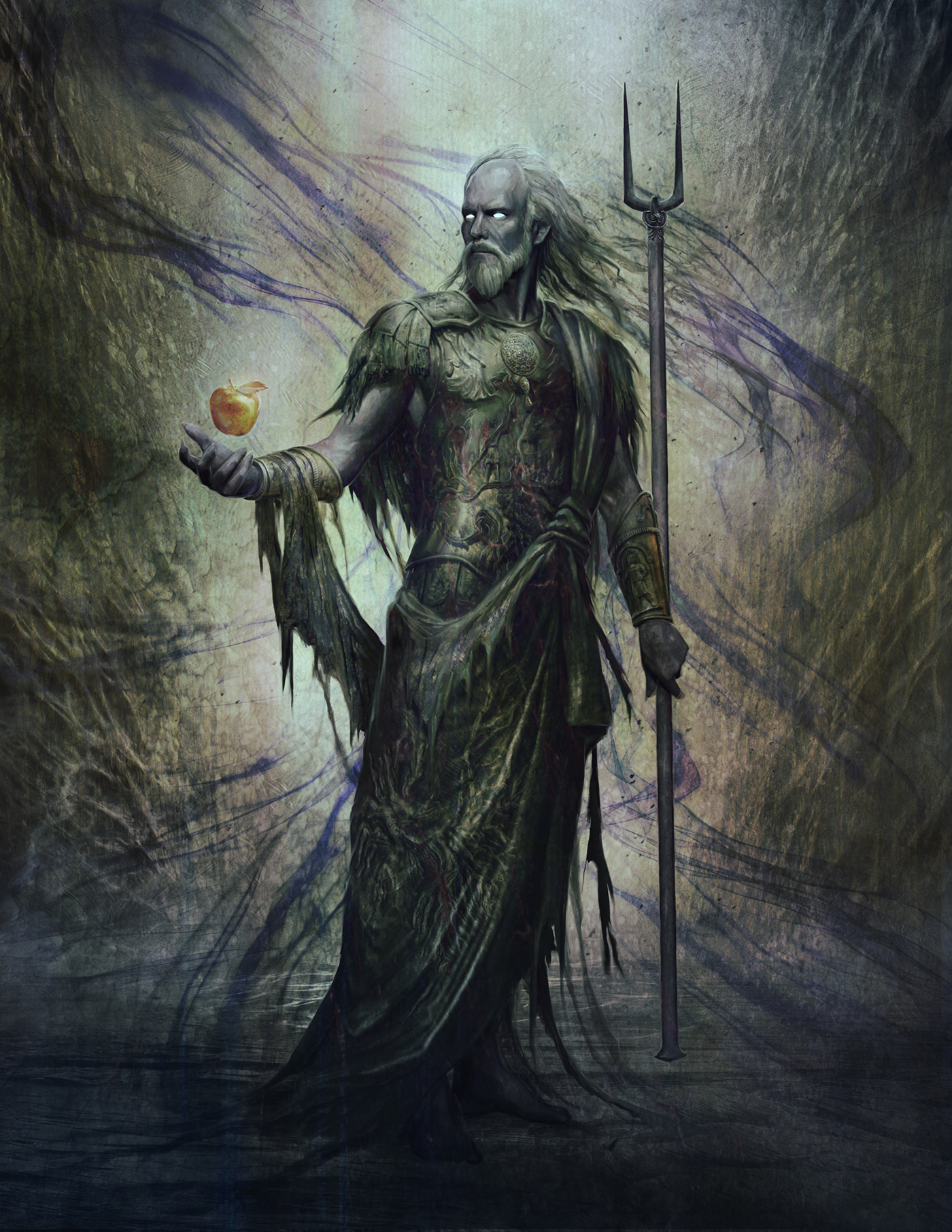Hades From Descendants Actor - Character Origins
The character of Hades, as he appears in popular stories like Descendants, really captures the attention of so many viewers, doesn't he? There's just something about his presence on screen that makes people wonder about the individual who brings such a powerful figure to life. This particular character, you know, has such a deep, ancient story behind him, stretching back to the very beginnings of recorded mythology, and it's quite something to see these old tales play out in a more modern setting.
The character Hades, as many might recall, comes from very old stories, really, where he was a powerful figure, a god, if you will, who looked after the underworld. This mythological background, as my text points out, shapes so much of who he is, a son of titans, and a brother to some very famous gods. His origins are, in a way, quite foundational to understanding the character we see today, providing a rich tapestry of lore that an actor can, in some respects, draw upon.
So, when we see the character of Hades in a film like Descendants, there's this whole history that an actor gets to play with, bringing this ancient, somewhat feared figure into a new light, which is quite fascinating, really. It gives us a chance to connect with a story that's been told for ages, just a little differently, allowing a contemporary audience to experience the depth of this mythological character that the hades from descendants actor portrays.
- Lindsie Chrisley
- Zendaya And Tom Holland Engaged
- Ren%C3%A9e Estevez
- Brock Purdy Wife
- Cast Of The Iron Claw
Table of Contents
- What is the Mythology Behind Hades in Descendants?
- Exploring the Underworld - Hades' Domain
- Hades' Role in the Cycle of Life
- Key Figures Connected to Hades
What is the Mythology Behind Hades in Descendants?
The character of Hades, as he is brought to life in stories like Descendants, has a truly deep and compelling background that reaches far into the past. His story is, in a way, woven into the very fabric of ancient Greek beliefs, making him a figure of considerable importance. He was, as many ancient accounts tell us, the god who held sway over the place beneath the earth, the very location where the departed would go. This association with the world below, which was also often simply called “Hades,” made his name a word that brought about a sense of quiet respect, or perhaps, a bit of unease, among the people of old Greece. It’s quite interesting, you know, how his name came to represent both the powerful figure himself and the shadowy territory he looked after, creating a rather strong link between the two concepts.
This powerful figure was, as the old stories recount, one of the most significant and, in some respects, formidable beings that the rich collection of Greek tales had to offer. He was, quite simply, the one who held the position of leader within the subterranean world, and he also held authority over those who had passed on. His identity was, you might say, deeply tied to this role, making him the ancient Greek king of the underworld and the god who oversaw the departed. So, the hades from descendants actor has quite a bit of ancient history to draw from when creating his portrayal.
Who is Hades, Really?
Hades was, first and foremost, the god who presided over death, which is a rather significant role, wouldn't you agree? It was he who held the reins of power in the underworld, and indeed, his very name became, in a way, completely interchangeable with that hidden world below. This meant that when people spoke of "Hades," they were often referring to the place itself, the shadowy domain, just as much as they were speaking of the powerful figure who governed it. He was, you know, an important figure because he embodied the very idea of an "other world," a place distinct from the everyday, living realm. Sometimes, he was also associated with the wealth that comes from the earth, like precious metals, which is a bit of a contrast to his primary role, but it shows his broad influence.
In ancient Greek beliefs, few people actually dared to speak his name out loud, which is quite telling, isn't it? If they did, many were, in fact, referring to his domain, the very place that many also called “Hades.” This fear or respect around his name really highlights his standing. He was, in some respects, the one who watched over the underworld, while another figure, Thanatos, had the specific job of causing death and guiding the spirits of the departed to their next destination. In a deeper sense, Hades was, you might say, a truly vital part of the natural rhythm of existence, ensuring that the cycle of life and its conclusion continued as it should. This gives the hades from descendants actor a lot of depth to work with.
Hades was, in essence, both the designation for the ancient Greek god who oversaw the underworld—a figure known in Roman stories as Pluto—and the designation for the shadowy location beneath the earth, which was considered the final resting place. This dual meaning of his name, you know, really emphasizes how deeply connected he was to his domain, almost as if he and the underworld were, in some respects, one and the same. He was, quite simply, the Greek god of the underworld, the one who held authority over those who had passed away, a figure of immense significance in the grand scheme of ancient tales.
What was Hades' Family Like?
Hades, as it turns out, had a rather interesting family tree, didn't he? He was, you know, a child born to the very powerful beings known as Cronus and Rhea, who were, in a way, the generation before the well-known Olympians. This family background, you might say, placed him right at the heart of some truly significant events in ancient tales. He was also, quite notably, a sibling to some of the most recognized figures in the old stories: Zeus, who became the king of the gods; Poseidon, who looked after the seas; and then his sisters, Demeter, who cared for the harvest, Hera, who was the queen, and Hestia, who watched over the hearth. So, you see, his connections were, in some respects, truly profound, tying him directly to the very fabric of the divine order, even if his assigned duties kept him somewhat apart from the rest.
He had, as a matter of fact, three older sisters. These were Hestia, who was the eldest, then Demeter, and also Hera. This means he was not the firstborn among his siblings, which is a detail that, you know, sometimes gets overlooked. Demeter, who was one of the children of the titans Cronus and Rhea, was also a sister to Zeus, Hestia, Hera, Hades himself, and Poseidon. Her most famous daughter, as many might know, was Persephone—the one who became the bride of Hades. This family dynamic, especially with his siblings, really sets the stage for his later role and how he interacts with the other powerful figures in the mythological narratives. The hades from descendants actor brings this family history to his portrayal.
In one particular story, we learn that Zeus, his younger brother, actually forced Cronus, their father, to bring up the other children—Hestia, Hera, Demeter, Hades, and Poseidon—all of whom Cronus had, you know, swallowed as soon as they were born. This event, where Hades and his siblings were brought forth from their father, is a pretty dramatic beginning to their existence and certainly shaped their collective destiny. Hades, being the brother of both Zeus and Poseidon, was, as a matter of fact, given authority over the underworld after the great conflict known as the Titanomachy. This was a massive war between the Olympians, his generation of gods, and the Titans, their parents' generation. So, his position was, in some respects, a direct outcome of this epic struggle, a division of the world among the victorious brothers.
Exploring the Underworld - Hades' Domain
The Greek underworld, which Hades oversaw, was a place of immense interest and, quite frankly, a bit of mystery in ancient beliefs. It was not just a simple location but a complex landscape with its own unique features and residents. People in ancient times often pondered what this place was like, and stories provided some, you know, rather vivid descriptions. It had its own geography, complete with distinct rivers that marked its boundaries or flowed through its different sections. There were also specific gateways, points of entry, that allowed passage into this shadowy realm. These details, you might say, really helped people picture the place that Hades, the character, called his own.
Within this subterranean world, there were, of course, some very important figures who played specific roles. There were, for example, judges who would assess the actions of the departed and determine their fate within the afterlife. These elements were, in some respects, crucial to how the ancients understood what happened after life ended. The beliefs about the afterlife in ancient times were, you know, quite varied and detailed, and the underworld, under Hades' watchful eye, was central to these ideas. So, when the hades from descendants actor steps into this role, he embodies the ruler of a place rich with such symbolic meaning.
How Did Hades Get His Power?
Hades, the brother of Zeus and Poseidon, was, as we touched upon, assigned his rule over the underworld following a truly significant event in ancient mythology: the Titanomachy. This was, you know, the great war between the Olympians, the younger generation of gods, and the Titans, their powerful parents. It was a conflict that, in a way, reshaped the entire cosmic order. After the Olympians emerged victorious from this epic struggle, the three brothers—Zeus, Poseidon, and Hades—drew lots to decide which part of the world each would govern. Zeus received the sky, Poseidon gained control of the seas, and Hades, by this division, was given the dominion over the underworld. This wasn't, you know, a choice he necessarily made, but rather an assignment, which, in some respects, set his path and defined his role for all time. It’s a rather important piece of his story, really, explaining how he came to hold such a powerful, yet somewhat solitary, position.
In time, the Roman figure Pluto, who was originally an aspect of Jupiter (their equivalent of Zeus), became independent and eventually merged with the Greek god Hades. Pluto was, as a matter of fact, considered the lord of the subterranean underworld, which, in a way, mirrored the Greek understanding of Hades' domain. This shows how, you know, different cultures sometimes borrowed and adapted beliefs, creating figures that were very similar in their roles and associations. So, the character's influence, you might say, spread beyond just one culture, reinforcing his status as a significant figure of the hidden world.
Hades' Role in the Cycle of Life
Hades was, in essence, a truly vital part of the natural rhythm of existence, which is a rather profound idea, isn't it? His role wasn't just about being a fearsome figure or a ruler of a dark place; it was about maintaining balance within the grand scheme of things. He ensured that the cycle of life, which includes its ending, flowed as it should. This means he wasn't, you know, simply a force of destruction, but rather a necessary component in the ongoing process of being. His presence, in a way, solidified the concept that all things have their time and place, including the transition from life to whatever comes next. This makes his character, as portrayed by the hades from descendants actor, more than just a villain; he's a fundamental force.
He was, you might say, an important figure because he incorporated the very idea of the “other world,” a realm distinct from the living, and sometimes, he also represented the unseen riches that lie beneath the earth. This dual aspect, where he was connected to both the departed and the earth's hidden treasures, shows a broader influence than just being a god of death. It suggests a connection to the very foundations of the world, making him a figure who, in some respects, touches upon both endings and beginnings, albeit in a very unique way. His position was, you know, absolutely crucial for the ancient understanding of the universe's workings.
Key Figures Connected to Hades
In addition to Hades himself, the underworld was also home to several other powerful figures, some of whom were greatly respected, and others who, you know, brought about a sense of dread among the people of ancient times. These figures played their own roles within the subterranean realm, contributing to its complex nature. Among them was, quite importantly, Hades’ own queen, Persephone, who shared his rule. Their story is, in a way, central to understanding the dynamics of the underworld and Hades’ personal connections. So, the hades from descendants actor often has to portray these relationships.
Who is Persephone and Her Connection to Hades?
Persephone was, as the stories tell us, the daughter of Zeus and Demeter, which makes her Hades’ niece, you know, a rather interesting family connection. She became the wife of Hades and, consequently, the queen of the underworld, a position of significant power. Her most important story, which is quite famous, recounts how Hades, in a way, took her to the underworld. This event, her abduction, is a pivotal moment in her myth and explains her dual role as both a goddess of spring and the ruler of the dead. It’s a tale that, in some respects, explores themes of loss, change, and the balance between life and the unseen world. This connection to Persephone adds a layer of personal history to the character that the hades from descendants actor might explore.
In one particular story, we hear about an encounter between Hades and Heracles, a very strong hero. Hades, in this account, refused to let Heracles take Cerberus, the multi-headed guardian dog of the underworld, even after Heracles had, you know, managed to beat him without using any weapons. Heracles, understandably quite upset by this refusal, shot Hades with an arrow. This incident shows that even powerful gods like Hades could, in a way, be challenged and even harmed, adding a bit of unexpected vulnerability to his character. It’s a detail that, you know, makes him seem a little more, shall we say, relatable, despite his immense power.
What About Tartarus and Other Underworld Residents?
Tartarus, a very dark and ancient place located beneath the earth, even deeper than Hades’ own general domain, was, in a way, the home for a small group of wrongdoers and those who were greatly
- St Elmos Fire Cast
- Rebbie Jackson
- Elizabeth Debicki Movies And Tv Shows
- Drummer Zak Starkey
- Bella Hadid Boyfriend

Myth Man's Hades, god of the Underworld

Hades by jrom-ai on DeviantArt

Hades by JasonEngle on DeviantArt